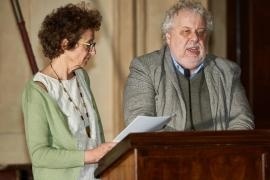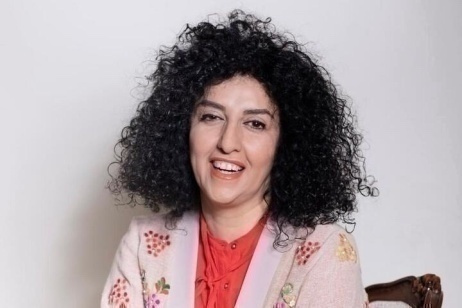
Klaas Smelik and Renata Tardani
On 25 July 1942, Julius Spier, Etty Hillesum’s therapist and teacher, confided to her:
This is the right moment to put in practice the saying: love your enemies. And if we say so, we must also somehow believe it is possible.
Despite his Jewish faith, Julius Spier was charmed by the New Testament, Christianity and the figure of Christ. Etty Hillesum, too used to read the New Testament, but from her diaries no particular interest in Jesus from Nazareth emerges. In the aforementioned passage, Spier made a reference to one of the main principles introduced by Jesus: “Love your neighbour”, and then added that it is does not suffice to share the word, but you must also believe that loving your enemies is really possible, even in times of war.
If one thing is not to hate, another is loving your enemy. How can you love your enemy? In her quest for an answer, Hillesum reflects – in the wake of Carl Gustav Jung, Spier’s teacher – on the presence of evil inside human beings, and she gets persuaded that it is not only the enemy who hosts evil, but good and evil are rooted in every human being.
Alas, inside us we already have everything: God and heaven and hell and earth and life and death and centuries, many centuries.
Etty Hillesum detects this simultaneous presence of both extremes under every circumstance in life. Good and evil are there in every situation, as well as in every individual.
... sometimes you hear people say: “You really turn everything to the good side.” I find it a dull remark. Things, everywhere, are completely good and, at the same time, completely bad. So they balance themselves, always and everywhere. I have never had the feeling I have to turn something to the good side, as everything is always and completely good as it is. Every situation, for how miserable, is something absolute, and contains both good and evil in itself.
This is why it is important to avoid thinking in rigid black and white categories. To be able to hate an enemy you must wear blinkers. On the one hand you have to look somewhere else not to see that he is a human being, too and on the other hand you have to ignore that the very features you hate in your antagonist are there also in the people who stand on your side.
During a conversation with my father, Klaas Smelik senior, “old and indomitable fighter of the proletarian cause”, Etty Hillesum tried to convince him of her conception according to which, between friends and foes there would be no essential difference. In her diary, she reports a detailed account of that exchange of views. The girl started by saying that reality does not match the inflexible mental scheme of black and white that is mainstream among the people in times of war, and invites him to notice how in the Westerbork camp, there are people who behave like the Nazis. She then tries – amidst the ravages of war , when hatred was the engine of the full machine focused on destruction – to convince her friend Klaas that no essential difference between the Germans and their victims really exists.
Hillesum puts forward the following example. For the daily management of the Westerbork camp, the German commander had appointed some Jews who had to assist him in carrying out his duty. One of those Jews, in the view of the young scholar, represented the typical example of somebody who hated the Germans but was not really any better than them. Etty Hillesum would then try to strengthen her statement through a description of the man’s appearance, followed by a psychological analysis.
Klaas, hatred comes to no avail. Reality is well different from how we build it in our minds. Take that assistant of ours. I think of him quite often. The thing that strikes me most is his straight and rigid neck. He hates his persecutors with a hatred that I suppose is justified, but he is a cruel man, as well. He would be the perfect commander of a concentration camp. I often looked at him while he stood at the entrance of the lager, almost as if he were there to go after his fellow Jews, it has never been a very pleasant view. I still remember the way he had given some dirty pieces of liquorices to a three-year old child who was crying: he has thrown them to him on a wooden table by telling in a fatherly way: pay attention not to get your face dirty. Looking back, it thinks it was about clumsiness and shyness rather than bad grace: simply, he did not succeed in finding the right tone. But he was also one of Holland’s most brilliant jurists and his very clever articles were magnificently formulated. Every time I saw him walk among the people, with that straight neck, his despotic gaze and his eternal small pipe, I came to think: he only lacks a whip in his hands, it would suit him fine.
But I felt no resentment toward him, I was too really interested in him. In some moments I terribly pitied him. He had such an unsatisfied or, better, un happy mouth: it was the mouth of a three-year old child who had not succeeded in gain his mother’s care. In the meanwhile he had passed his thirties, had become a handsome man, a well-known jurist and father to two sons: but that mouth typical of a resentful kid had remained the same although, of course, as time went by it had become a bit bigger. Giving him a thorough look, he was not attractive at all.
Look, Klaas: that man was full of hatred for those whom we could call our executioners, but he could have been a perfect executioner himself, and a persecutor of helpless people, too.
Etty Hillesum talks about that clerk of a Jewish council to make an example, trying to prove to her friend Klaas that from his way of thinking, based on some rigidly clashing categories, he would obtain nothing. She does not though express a condemnation for that potential executioner. Hillesum wants to reach the essence of that person but without preaching him morals. And she goes on speaking:
Look, Klaas: the situation, actually, can be summed up as follows: that man hated with all his forces those whom we could call our executioners, but he could have been a perfect executioner himself, and a persecutor of helpless people, too. And yet I felt so sorry for him. Do you succeed in understanding something about this? He never had friendly contacts with his fellow human beings and, if he saw that others had, he gave them a sneaky look followed by an expression of unconfessed jealousy. Later on, a colleague who had known him for years told me some little facts about his life. In the first day of war he had thrown himself from the third floor but he had not succeeded in committing suicide, although he really meant to. Later he tried to do it again, this time by throwing himself under a car, but also this attempt had failed. Then he had spent some months in a psychiatric institute. He was scared, only scared. He was a really brilliant and keen jurist, and in academic discussions he always had the last word. In the deciding moment, however, he had jumped from the window out of fear. His wife had to walk around the house on her toes and he scolded his frightened children. I was so really sorry for them. What a kind of life is that? Klaas, I did not want to say anything else: the work that remains to be done on ourselves is so huge not to leave us the tiniest opportunity to hate our so called enemies. It suffices, to prevent us from doing so, the hostility that keeps on characterizing our relations. And it will suffice to say that also our executioners and evil people exist. Ultimately, though, I really do not believe in the existence of the so called “evil”.
Behind the man’s unhappy face and “straight and rigid neck” there was a concealed existential scare that caught Etty Hillesum’s attention. As a good alumna of Spier’s, she learnt very well the art of observing people.
It is not very difficult to hate a group you do not belong to, says Hillesum, but we must realize there are some executioners also inside your own. And this is much more difficult to accept.
Etty Hillesum though makes a further step: she tries to observe those executioners’ soul. They are not simply that way, as their behaviour conceals a history, the history that turned them into what they are like today. If we kept this into account, we would be able to better understand what is going on and that there is no reason to be afraid. Maybe, if you learn about your personal history, you will manage to get in touch with the others. In her diary, we find the following, remarkable passage:
...If an SS man were to kick me to death, I should nevertheless look into his face and wonder to myself, both in terrified amazement and out of human interest, My God, you poor fellow, what terrible things must have happened in your life to bring you to this pass?
My father, Klaas Smelik, did not have the patience to listen to her delve so deeply into these psychological insights, and had a “tired and discouraged gesture”. What his friend proposed would maybe be realized after years, given the war circumstances; it would be instead necessary to do something immediately, but Etty Hillesum expressed a different view:
Then Klaas had a tired and discouraged gesture and said: “But what you want demands lots of time, do we ever have it?” I replied: “But to achieve what you want we have worked for two thousand years of our Christian era, without taking into account the many thousands years in which a humanity still existed – and what do you think of the result, if I am allowed to ask this question?”
And with my same passion as always, even though I started finding myself boring because I always end up repeating the same things, I said: “It is precisely the only opportunity we have, Klaas, I do not see any alternatives, each of us must collect our thoughts and destroy in yourselves what we think we should destroy the others for. And let’s convince ourselves that every atom of hatred that we add to the world makes it even more inhospitable.”
And Klaas, old and indomitable fighter of the proletarian cause, replied in surprise and bewilderment altogether: “Yes, but this... would be Christianity again!”
Hence, Hillesum had put her friend to the corner as she knew he did not get well at all with the church. Neither she, though, was willing to think in rigid categories: if Christianity had had something good to offer she would have not rejected it, albeit she was and she would remain a Jew. She had no intention whatsoever to convert, differently fromsome believe they can inferfrom their reading of her diaries, but she never let go the occasion of mocking her old lover by telling him precisely: “And I, amused by such a bewilderment, have replied very calmly: “Of course, Christianity, and why not, then?”.






